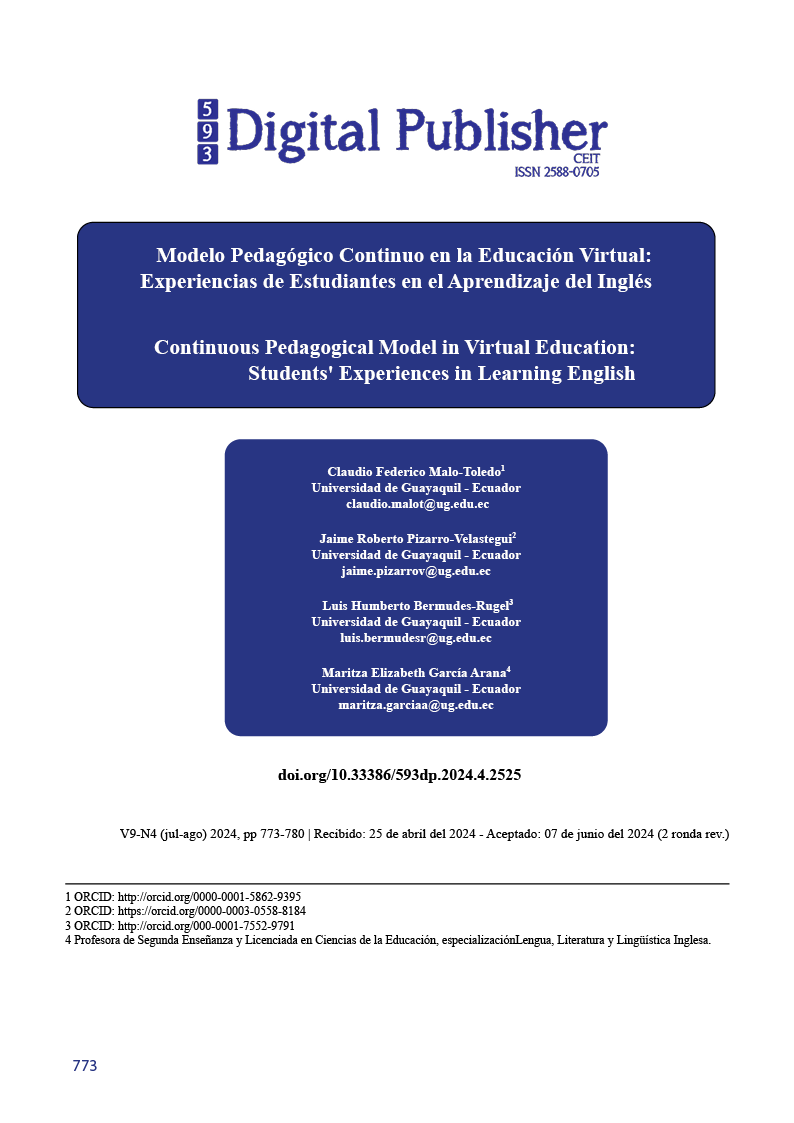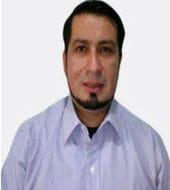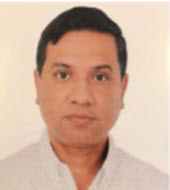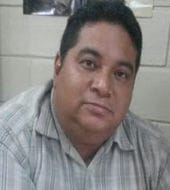Continuous Pedagogical Model in Virtual Education: Students' Experiences in Learning English
Main Article Content
Abstract
This paper focuses on determining the experiences of the students in the first year of the Pedagogy of National and Foreign Languages degree program, at the University of Guayaquil, regarding the use of the PACIE methodology and English language learning during the virtual education period 2022-2023. Modality adopted by the university due to the outbreak of the SARS-CoV-2 virus, which caused the closure of face-to-face classes. The investigation is based on a mixed approach, accompanied by the inductive-deductive and the analysis and synthesis methods. The survey technique with its respective instrument, the questionnaire, was used to obtain data. The analysis of the results shows that the experiences of the students have been satisfactory in the use of the PACIE methodology for learning English as a foreign language. In summary, the aforementioned methodology, until now, substantially responds to the educational requirements and the dynamics of the current system.
Downloads
Article Details

This work is licensed under a Creative Commons Attribution-NonCommercial-ShareAlike 4.0 International License.
1. Derechos de autor
Las obras que se publican en 593 Digital Publisher CEIT están sujetas a los siguientes términos:
1.1. 593 Digital Publisher CEIT, conserva los derechos patrimoniales (copyright) de las obras publicadas, favorece y permite la reutilización de las mismas bajo la licencia Licencia Creative Commons 4.0 de Reconocimiento-NoComercial-CompartirIgual 4.0, por lo cual se pueden copiar, usar, difundir, transmitir y exponer públicamente, siempre que:
1.1.a. Se cite la autoría y fuente original de su publicación (revista, editorial, URL).
1.1.b. No se usen para fines comerciales u onerosos.
1.1.c. Se mencione la existencia y especificaciones de esta licencia de uso.
References
Al Yafaei, Y., & Attamimi, R. (2019). Understanding Teachers' Integration of Moodle in EFL Classrooms: A Case Study. . English Language Teaching, 12(4), 1-6.
Al-Ani, W. (2008). English as foreign language student teachers’ perception of the use of Moodle in foundations of education course. Malaysian Journal of Learning and Instruction, 5, 63-78.
Basantes, A. V., Naranjo, M. E., & Ojeda, V. (2018). Metodología PACIE en la Educación Virtual: una experiencia en la Universidad Técnica del Norte. Formación universitaria , 11(2), 35-44.
Becerra, M. (2014). Metodología PACIE Una Estrategia Emergente En La Gestión Virtual Universitaria. Impulsando La Innovación Educativa. . Encuentro de Ciencias y Tecnología Urbe, 28-45.
Brandle, K. (2005). Are you ready to Moodle? . Language Learning Technology, 9(2), 16-23. Camacho, N. (2008). Metodología PACIE en los Ambientes Virtuales de Aprendizaje (AVA):
Diálogos Educativos. 24(12), 9-14. doi:Doi:org/10.4067/S0718-50062018000200035
Cobo-Rendón, Jofré, C. B., Lobos, K., Martin, N. C., & Guzman, E. (2022). Return to university classrooms with Blended Learning: a possible post-pandemic COVID-19 scenario. In Frontiers in Education, (p. 482).
Cobos Velasco, J. C., Simbaña Gallardo, V., & Jaramillo Naranjo, L. (2020). El mobile learning mediado con metodología PACIE para saberes constructivistas. Sophia, colección de Filosofía de la Educación, (28), 139-164.
Espinar, C. (2021). Aplicación de Moodle para fortalecer el proceso de enseñanza de inglés en la educación abierta. Revista Tecnológica Ciencia y Educación Edwards Deming, 5(1).
Flores, K. M., & Bravo, M. d. (2012). Metodología PACIE en los ambientes virtuales de aprendizaje para el logro de un aprendizaje colaborativo. . Diálogos educativos , (24), 3- 17.
Ibañez-Etxeberria, A., Gómez-Carrasco, C., Fontal, O., & García-Ceballos, S. (2020). Virtual environments and augmented reality applied to heritage education. An evaluative study. Applied Sciences, 10(7), 2352. Applied Sciences, 10(7), 2352.
Lacka, E., Wong, T., & Haddoud, M. (2021). Can digital technologies improve students' efficiency? Exploring the role of Virtual Learning Environment and Social Media use in Higher Education. . Computers & Education, 163, 104099.
Littlejohn, A., & Pegler, C. (2007). Preparing for blended e-learning. . Routledge.
Manotas Salcedo, E., Pérez Rodríguez, A., & Contreras Pulido, P. (2018). Análisis de Vídeo- lecciones en MOOC enfocados en la formación pedagógica de docentes en Educación Superior. Un estudio de caso.
Martñinez, E. L., & Fuentes, M. R. (2014). Implementación de la metodología PACIE en cursos semipresenciales en el Entorno Virtual de Aprendizaje de TIC. . Revista Iberoamericana de Producción Académica y Gestión Educativa, 1 (1).
Mohmmed, A., Khidhir, B. A., Nazeer, A., & Vijayan, V. (2020). Emergency remote teaching during Coronavirus pandemic: the current trend and future directive at Middle East College Oman. . Innovative infrastructure Solutions, 5, 1-11.
Oliveira, G., Grenha Teixeira, J., Torres, A., & Morais, C. (2021). An exploratory study on the emergency remote education experience of higher education students and teachers during the COVID‐19 pandemic. . British Journal of Educational Technology, 52(4), 1357- 1376.
Oñate, L. (2009). La Metodoloía PACIE . Quito : Fundación para la Actualización Tecnológica de Latinoamérica.
Rodriguez, Y. T. (2018). Entorno virtual de aprendizaje centrado en la metáfora educativa.
Universidad Ciencia y Tecnología.
Simanullang, N., & Rajagukguk, J. (2020). Learning Management System (LMS) based on moodle to improve students learning activity. . Journal of Physics: Conference Series (Vol. 1462, No. 1, p. 012067). IOP Publishing.
VICERRECTORADO ACÁDEMICO. (2023). GUÍA METODOLÓGICA ACADÉMICA PARA EL DESARROLLO DEL PROCESO DE ENSEÑANZA APRENDIZAJE EN LAS ASIGNATURAS, CURSOS O SU EQUIVALENTE QUE SE IMPARTIRÁN MEDIANTE ACTIVIDADES PRESENCIALES, EN LÍNEA Y/O HÍBRIDAS, PARA EL CICLO ACADÉMICO CII 2023-2024. Guayaquil.





